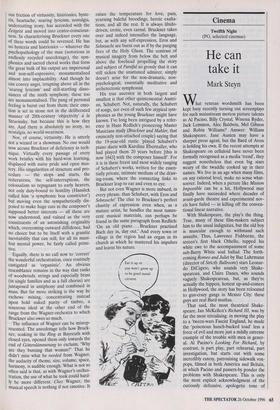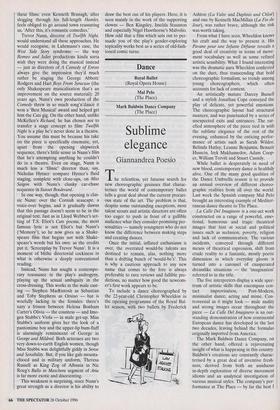Cinema
Twelfth Night (PG, selected cinemas)
He can take it
Mark Steyn
hat veteran wordsmith has been kept busy recently turning out screenplays for such mainstream motion picture talents as Al Pacino, Billy Crystal, Winona Ryder, Jack Lemmon, Alec Baldwin, Mel Gibson and Robin Williams? Answer: William Shakespeare. Jane Austen may have a sharper press agent, but the Bard of Avon is holding his own. If the recent attempts at Shakespeare on celluloid have never been formally recognised as a media 'trend', they suggest nonetheless that even big stars weary of the twaddle cooked up in their names. We live in an age when many films, on any rational level, make no sense what- soever. Indeed, when a picture like Mission Impossible can be a hit, Hollywood may finally have succeeded where decades of avant-garde theatre and experimental nov- els have failed — in killing off the conven- tional linear narrative.
With Shakespeare, the play's the thing. True, many of these film-makers subject him to the usual indignities, but the old boy is muscular enough to withstand such assaults. Thus, Lawrence Fishburne, the screen's first black Othello, tupped his white ewe to the accompaniment of some sub-Barry White soul ballad. The forth- coming Romeo and Juliet by Baz Luhrmann (director of Strictly Ballroom) stars Leonar- do DiCaprio, who sounds very Shake- spearean, and Claire Danes, who sounds vaguely Shakespearean, but, as they're actually the hippest, hottest up-and-corners in Hollywood, the story has been relocated to gun-crazy gangs in Mexico City: these guys are real Bard muthas.
That said, the most theatrical Shake- speare, Ian McKellen's Richard III, was by far the most trivialising: in moving the play to a 'tween-wars Fascist England, he made the 'poisonous hunch-backed toad' less a force of evil and more just a mildly extreme example of the trouble with men in gener- al. Al Pacino's Looking For Richard, by contrast, is part play, part rehearsal, part investigation, but starts out with some incredibly cutesy, patronising sidewalk vox- pops, filmed in both America and Britain, in which Pacino and passers-by ponder the problems with Shakespeare. This is only the most explicit acknowledgment of the curiously defensive, apologetic tone of
these films: even Kenneth Branagh, after slogging through his full-length Hamlet, feels obliged to go around town reassuring us, 'After this, it's romantic comedies.'
Trevor Nunn, director of Twelfth Night, would understand all these approaches. He would recognise, in Luhrmann's case, the West Side Story syndrome — the way Romeo and Juliet productions kinda sorta wish they were doing the musical instead — just as directors of A Comedy of Errors always give the impression they'd much rather be staging the George Abbott/ Rodgers and Hart Boys From Syracuse (the only Shakespeare musicalisation that's an improvement on the source material): 20 years ago, Nunn's own production of the Comedy threw in so much song'n'dance it won a 'Best Musical' award and helped get him the Cats gig. On the other hand, unlike McKellen's Richard, he has chosen not to transfer a stage concept to film: Twelfth Night is a play he's never done in a theatre. You assume this must be because his take on the piece is specifically cinematic, yet, apart from the opening shipwreck sequence, there's little sense in Nunn's film that he's attempting anything he couldn't do in a theatre. Even on stage, Nunn is much less a 'filmic' director than, say, Nicholas Hytner: compare Hytner's fluid staging, complete with close-ups, on Miss Saigon with Nunn's clunky car-chase sequence in Sunset Boulevard.
In one way, though, that opening is clas- sic Nunn: over the Cornish seascape, a voice-over begins, and it gradually dawns that this passage doesn't seem to be in the original text. Just as in Lloyd Webber's set- ting of T.S. Eliot's Cats poems, the most famous lyric is not Eliot's but Nunn's (`Memory), so he now gives us a Shake- speare film that begins not with Shake- speare's words but his own: as the credits put it, 'Screenplay by Trevor Nunn'. It is a moment of blithe directorial cockiness in what is otherwise a deeply conventional reading.
Instead, Nunn has sought a contempo- rary resonance in the play's androgyny, playing up the sexual ambiguity in the cross-dressing. This works in the male cast- ing — Stephen Mackintosh as Sebastian and Toby Stephens as Orsino — but is woefully lacking in the females: there's nary a frisson between Helena Bonham Carter's Olivia — the countess — and Imo- gen Stubbs's Viola — in male get-up. Miss Stubbs's uniform gives her the look of a pantomime boy and the upper-lip bum-fluff is alarmingly reminiscent of George in George and Mildred. Both actresses are two very down-to-earth English women, though Miss Stubbs was delightfully giddy in Sense and Sensibility. But, if you like gals mousta- chioed and in military uniform, Theresa Russell as King Zog of Albania in Nic Roeg's Ballo in Maschera segment of Aria is far more exotic and disorienting.
This weakness is surprising, since Nunn's great strength as a director is his ability to draw the best out of his players. Here, it is seen mainly in the work of the supporting clowns — Ben Kingsley, Imelda Staunton and especially Nigel Hawthorne's Malvolio. How odd that a film which sets out to per- suade you of the play's gender-exploring topicality works best as a series of old-fash- ioned comic turns.



















































































 Previous page
Previous page